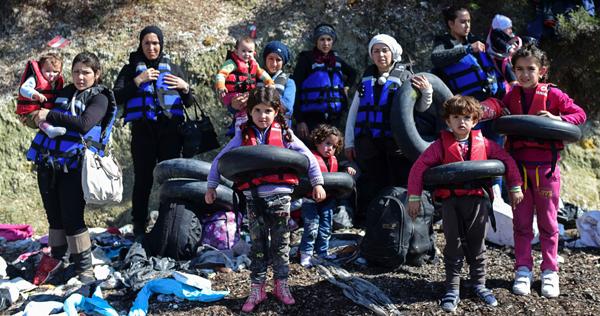You are here
Germany says it can take half-a-million migrants as Greek islands overwhelmed
By AFP - Sep 08,2015 - Last updated at Sep 08,2015

A man carries a child as migrants and refugees arrive on a dinghy after crossing from Turkey to Lesbos Island, Greece, Tuesday (AP photo)
BERLIN — Germany said it could take half-a-million refugees annually to help Europe's migrant crisis as Greece's Aegean islands struggled Tuesday to cope with another wave of desperate humanity.
Reflecting deepening concern, the European Union's president warned the EU faced a years-long refugee crisis, while the UN called on all countries of the world to join in tackling the problem.
Chancellor Angela Merkel's deputy, Sigmar Gabriel, said Germany "could surely deal with something in the order of half-a-million [refugees] for several years."
And Merkel herself urged greater flexibility in EU migrant quotas and stressed that the crisis should lead to changes in Europe's policy.
Germany has previously said it expects to receive 800,000 asylum-seekers this year, four times the 2014 total.
Berlin would keep accepting "a greatly disproportionate share" among EU members "because we are an economically strong country", Gabriel said late Monday.
But it was unacceptable for the EU to keep relying on just a few countries, such as Austria, Sweden and Germany, he added, saying "that's why I am certain that European policy needs to change".
With Greece's Migration Minister Yiannis Mouzalas admitting the island of Lesbos was "on the verge of explosion", the Greek authorities opened a new centre to process the 30,000 refugees the UN said were stuck there and on other Aegean Sea flashpoints, with Athens promising more for other bottlenecks.
Greece's migrant reception agency said it had asked the EU for emergency medical aid, bedding equipment and over 9.5 million euros ($10.6 million) to support reception services on Lesbos, Samos and Kos and send an operational unit to Chios.
Lesbos Mayor Spyros Galinos said procedural pressures were easing after an additional 140 staff arrived from Athens to handle migrant and refugee registration.
"Some 7,000 people were registered yesterday and we expect at least the same number today," he told AFP.
'Government doesn't care'
Earlier, a handful of coastguards and riot police armed with batons struggled to control some 2,500 migrants in Lesbos' main port, screaming "keep back" as the crowds surged towards a government-chartered ferry bound for Athens.
"It was horrible the last three days... There are no rooms, no hotels, no bathrooms, no beds, no anything," said Hussam Hamzat, a 27-year-old engineer from Damascus who finally got his departure papers Tuesday after an overnight wait.
"I stayed here eight, nine days — oh my God, I can't even remember," said Aleddin, an engineering student hoping to join his brother in Germany.
"Some people have been here for 14 or 15 days. The government doesn't care."
The migrants are desperate to get into northern EU countries that have thrown open their doors — but between them lie several countries that are way-stations in what for many is a gruelling trek.
Several hundred migrants broke through police lines at Roszke, on Hungary's southern border with Serbia, local media reported.
And in the Macedonian border town of Gevgelija, hundreds of migrants poured across the border from Greece before heading to rail and bus stations.
The scenes underscored the task facing authorities across Europe as they struggle with waves of people trudging across the continent, many of them Syrians fleeing war and misery.
EU President Donald Tusk warned the human haemorrhage to Europe would be long-lasting.
"The wave of migration is not a one-time incident but the beginning of a real exodus, which means that we will have to deal with this problem for many years to come," Tusk said in a speech at a Brussels think-tank.
In Geneva, the UN's special representative for migration and development, Peter Sutherland, said countries worldwide must be asked to do their share.
"We should have a European response as part of a global response," said Sutherland, urging an international conference "where every country is held up to the spotlight".
Austrian Chancellor Werner Faymann called again for an EU summit, appealing for a return of the spirit of urgency and cooperation seen in the 2008 financial crisis.
"In the financial crisis of 2008 we did everything we could to prevent a collapse of banks and the financial system. We must demonstrate the same efforts now so that the right to asylum can be upheld," Faymann said in Vienna.
The remarks touched on a deep east-west division within the EU about how to respond to the crisis, with former communist-ruled members of the 28-nation bloc taking a hardline approach.
Hungary vowed Tuesday to speed up construction of an anti-migrant fence on its 175-kilometre southern border.
The barrier intends to buttress a razor-wire fence that was completed on August 29 yet has failed to stop large numbers of people climbing over or under it.
EU plan
European Commission chief Jean-Claude Juncker is expected Wednesday to unveil a plan to relocate 120,000 migrants from frontline EU states.
Germany would take more than 31,000 migrants, France 24,000 and Spain almost 15,000, a source told AFP. Separately, British Prime Minister David Cameron said Monday Britain could take 20,000 over five years.
But Merkel urged caution.
She described Juncker's plan as "an important first step" but urged the bloc not to set a rigid quota ceiling and to factor in the situation on the ground.
The migrants' plight has touched hearts around the world, spurred especially by pictures last week of three-year-old Syrian Aylan Kurdi, whose lifeless body washed up on a Turkish beach.
Venezuela said it would accept 20,000 refugees, Brazilian President Dilma Rousseff declared migrants would be welcomed there with "open arms" and Chile's leader Michelle Bachelet said it "was working to take a large number". Canada's Quebec province also said it will take 3,650 this year.
New figures released Tuesday by the UN High Commissioner for Refugees (UNHCR) said 381,412 people had arrived in Europe by sea so far this year, including 121,000 who had landed in Italy and 258,365 in Greece.
A total of 2,850 people died, or were listed as missing, in the perilous crossing of the Mediterranean.
Related Articles
ATHENS — At least 16 people, including two children, drowned after an inflatable boat carrying refugees and migrants sank off Greece's Lesbo
ATHENS — Greek authorities were gearing up on Saturday to send hundreds of failed asylum-seekers back to Turkey, which is racing to set up r
ATHENS — Greece warned Sunday that the number of refugees and migrants on its soil could more than triple next month, reaching as many as 70

















